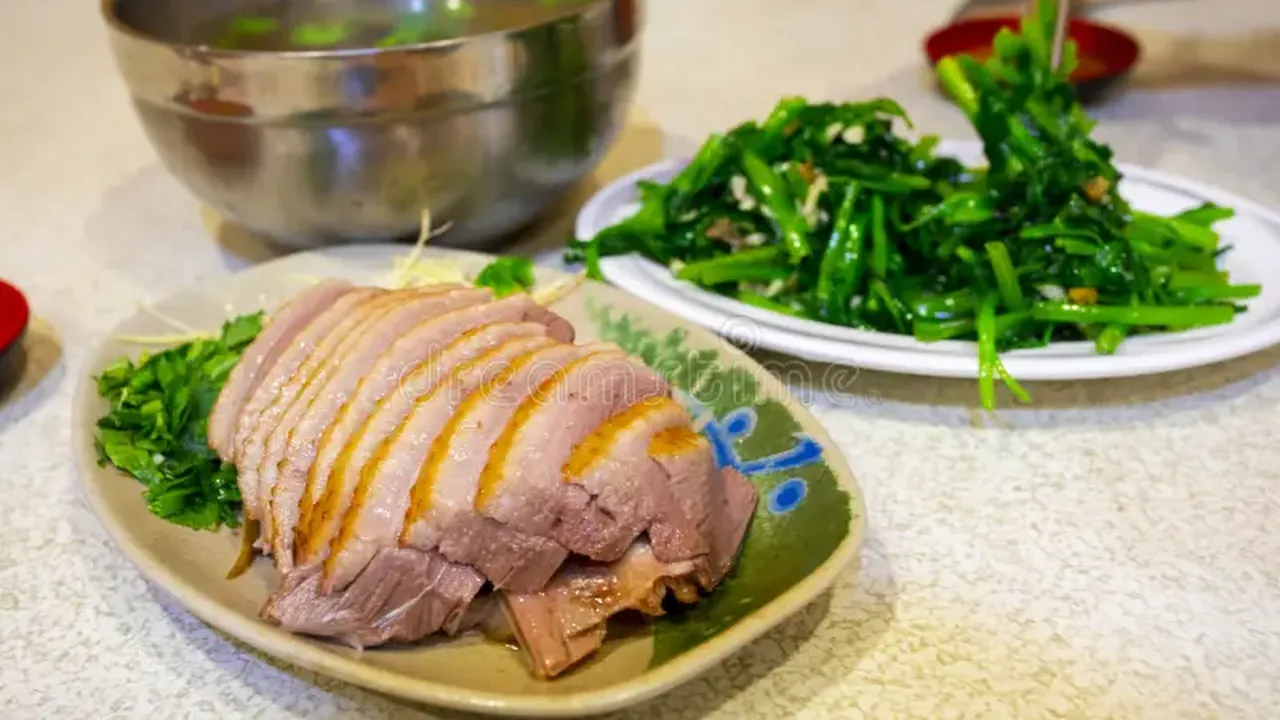Taiwanese Vegetarian Cuisine: A Delicious Discovery
Sample meta description.

A Journey into the Heart of Plant-Based Taiwanese Food Culture
Taiwan, often celebrated for its vibrant night markets and diverse street food, holds a secret treasure for vegetarians and food enthusiasts alike: a rich and innovative vegetarian cuisine. Unlike the often limited vegetarian options found elsewhere, Taiwan boasts a wide array of dishes that are not only delicious but also deeply rooted in Buddhist traditions and culinary artistry. This isn't just about tofu and vegetables; it's about transforming simple ingredients into culinary masterpieces that rival their meat-based counterparts. Get ready to explore a world of flavors, textures, and aromas that will redefine your understanding of vegetarian food.
The Historical Roots of Taiwanese Vegetarianism (Vegetarian History)
The prevalence of vegetarianism in Taiwan can be traced back to the strong influence of Buddhism. Many Taiwanese Buddhists adhere to a vegetarian diet, either full-time or on specific days of the month. This religious practice has fostered a culture of vegetarian culinary innovation. Over centuries, skilled chefs have perfected the art of creating dishes that mimic the taste and texture of meat, using ingredients like tofu skin, mushrooms, and gluten. This ingenuity has resulted in a diverse and sophisticated vegetarian cuisine that goes far beyond simple vegetable dishes.
Key Ingredients in Taiwanese Vegetarian Cooking (Vegetarian Ingredients)
The magic of Taiwanese vegetarian cuisine lies in its clever use of ingredients. Forget bland and boring; these dishes are packed with flavor and texture. Here are some of the stars of the show:
- Tofu Skin (Yuba): This is a versatile ingredient made from the film that forms on the surface of heated soy milk. It can be layered, folded, fried, or steamed, and is often used to create convincing meat substitutes.
- Mushrooms: From shiitake and enoki to oyster mushrooms and wood ear fungus, mushrooms are a staple in Taiwanese vegetarian cooking. They add umami, a savory depth of flavor, and a meaty texture to dishes.
- Gluten (Seitan): Also known as wheat gluten, seitan is a chewy and protein-rich ingredient that can be shaped and seasoned to resemble meat. It's often used in stir-fries, stews, and even vegetarian versions of Taiwanese sausages.
- Vegetables: Of course, vegetables play a crucial role. Expect to see a wide variety of seasonal produce, from leafy greens and root vegetables to gourds and legumes.
- Soy Products: Beyond tofu, soy milk, soy sauce, and fermented soybeans (such as tempeh) are essential for adding flavor and protein to vegetarian dishes.
Must-Try Taiwanese Vegetarian Dishes (Vegetarian Dishes)
Now that you know the basics, let's dive into some of the dishes you absolutely have to try:
- Vegetarian Oyster Mushroom Noodles (素蚵仔麵線): This is a vegetarian take on a classic Taiwanese street food. The "oysters" are typically made from mushrooms, and the broth is thick, savory, and slightly sweet.
- Vegetarian Stinky Tofu (素臭豆腐): Don't let the name scare you! This fermented tofu is deep-fried and served with pickled cabbage, chili sauce, and garlic sauce. It has a pungent aroma but a surprisingly delicious flavor.
- Vegetarian Dumplings (素水餃): Filled with a mixture of vegetables, tofu, and mushrooms, these dumplings are a comforting and satisfying meal.
- Vegetarian Braised Pork Rice (素滷肉飯): A vegetarian version of Taiwan's national dish, featuring braised mushrooms and tofu in a rich and savory sauce, served over rice.
- Vegetarian Hot Pot (素火鍋): A communal dining experience where you cook your own vegetables, tofu, mushrooms, and noodles in a flavorful broth.
Where to Find the Best Taiwanese Vegetarian Food (Vegetarian Restaurants)
Finding vegetarian food in Taiwan is surprisingly easy. Many restaurants offer vegetarian options, and there are also dedicated vegetarian restaurants that cater specifically to plant-based eaters. Look for the character "素" (sù), which indicates vegetarian food. Here are some tips for finding the best spots:
- Night Markets: Many night market vendors offer vegetarian versions of popular street food dishes.
- Buddhist Temples: Some Buddhist temples have attached restaurants that serve delicious and affordable vegetarian meals.
- HappyCow App: This app is a great resource for finding vegetarian and vegan restaurants around the world, including Taiwan.
- Ask Locals: Don't be afraid to ask locals for recommendations! They'll often know the best hidden gems.
Recommended Vegetarian Products and Their Uses (Vegetarian Product Recommendations)
To recreate the flavors of Taiwan at home, consider these product recommendations:
- VegeFarm Vegetarian Abalone (素食鮑魚): Made from konjac and flavored to mimic abalone, this product adds a touch of luxury to stir-fries and soups.
- Usage Scenario: Slice and add to a vegetarian stir-fry with vegetables and mushrooms.
- Comparison: While it doesn't taste exactly like abalone, it provides a similar texture and visual appeal. Real abalone is significantly more expensive.
- Price: Approximately $10 USD per can.
- King Oyster Mushrooms (杏鮑菇): These mushrooms have a meaty texture and can be grilled, pan-fried, or stir-fried.
- Usage Scenario: Grill with a marinade of soy sauce, ginger, and garlic for a delicious vegetarian steak.
- Comparison: Offers a more substantial and satisfying texture than button mushrooms. Cheaper than most meat substitutes.
- Price: Approximately $5 USD per pound.
- Dried Tofu Skin Sheets (腐竹): These sheets can be rehydrated and used in a variety of dishes, from stir-fries to soups.
- Usage Scenario: Soak in warm water until softened, then cut into strips and add to a vegetarian hot pot.
- Comparison: More versatile than regular tofu skin as it can be stored for longer and rehydrated as needed.
- Price: Approximately $8 USD per package.
- Lee Kum Kee Vegetarian Oyster Sauce (素蠔油): A vegetarian version of oyster sauce, made with mushroom extract.
- Usage Scenario: Use as a flavor enhancer in stir-fries, noodle dishes, and braised dishes.
- Comparison: Provides a similar umami flavor to regular oyster sauce without the seafood.
- Price: Approximately $4 USD per bottle.
- Three Cup Chicken Sauce (三杯雞醬): A premade sauce that makes it easy to recreate the flavors of three cup chicken (a popular Taiwanese dish) using vegetarian ingredients.
- Usage Scenario: Stir-fry with mushrooms, tofu, and basil for a quick and flavorful meal.
- Comparison: Saves time and effort compared to making the sauce from scratch.
- Price: Approximately $6 USD per bottle.
The Future of Taiwanese Vegetarian Cuisine (Vegetarian Trends)
Taiwanese vegetarian cuisine is constantly evolving. With a growing awareness of the benefits of plant-based diets, more and more chefs are experimenting with new ingredients and techniques. Expect to see even more innovative and delicious vegetarian dishes in the years to come. The future of Taiwanese vegetarianism is bright, and it's a cuisine that's sure to delight food lovers of all kinds.
:max_bytes(150000):strip_icc()/277019-baked-pork-chops-with-cream-of-mushroom-soup-DDMFS-beauty-4x3-BG-7505-5762b731cf30447d9cbbbbbf387beafa.jpg)






